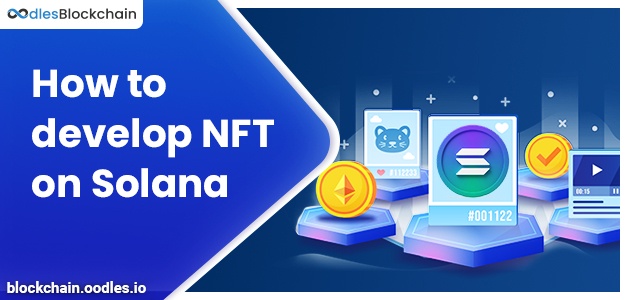When it comes to non-fungible tokens (NFTs) and decentralized finance, Solana blockchain development services are already gaining traction in the web3 space. The market cap of its native token, SOL, now places it ninth among all cryptocurrencies. Indeed, the interest in Solana NFTs has increased significantly throughout the course of 2022. Solana satisfies users' requests for an efficient blockchain platform with quicker and less expensive transactions. As a result, Solana is becoming the first choice for dApp and NFT solutions development. Additionally, users are switching to Solana at an ever-increasing rate as it keeps adding new integrations.
One of Web3's most significant successes to date in this regard is Solana NFTs. Unfortunately, this does not change the fact that learning how to use new blockchains and NFT marketplaces is still a difficult undertaking. The good news is that we are here to help you with whatever you need to do to take part in the Solana ecosystem. Read on to know why Solana crypto and NFTs are so popular, and how to get the most out of this brand-new environment.
Why Choose Solana for NFT Development?
The groundbreaking PoH (Proof-of-History) consensus model is a key component of the open-source Solana blockchain network. It essentially helps the platform speed up transactions and makes Solana preferable for building scalable, decentralized applications. PoH consensus enables Solana-based dApps to process transactions quite rapidly than many legacy blockchains, including Ethereum. Also, Solana levies much lower gas fees. Entrepreneurs, investors, and content producers are choosing Solana to construct apps that support NFT trading, in addition to NFTs development. The Solana NFT standard and minting guidelines also give developers the flexibility they require. Let's examine a few advantages a Solana NFT marketplace might offer.
Fast Per-Second Transactions
The Solana blockchain can complete 2500 transactions per second on average. It emphasizes how fast it is, enabling transaction processing quickly on any NFT marketplace built on it. TPS, however, is a dynamic statistic that is constantly shifting.
Low Transaction Price
Solana's fast throughput and low transaction fees of $0.00025 make it an ideal platform for developing NFTs and NFT marketplaces.
No mempool problems
There is no mempool issue with Solana. The space where completed transactions await approval is mempool. This functionality enables instant transactions on Solana NFT markets.
Growing Ecosystem
The Solana ecosystem is expanding rapidly. It makes it efficient to manage numerous dApps, smart contracts, and currency without experiencing network congestion.
Writing Programs is Easy
Solana uses Rust programming language. It makes it simpler to design and develop a variety of applications. Solana is a versatile platform for creating dApps, NFT marketplaces, and other types of applications.
NFT Marketplace on Solana
Solana aids in the development of scalable crypto applications today. Although it is behind Ethereum, it is currently the second-most popular blockchain network. It makes it possible for dApp developers to swiftly release dApp and NFT applications while avoiding the congestion and scalability problems that afflict current networks. With a focus on scalability, Solana aims to give developers the infrastructure and bandwidth they need to make their decentralized applications and services popular worldwide. Both the traders and the administrators of these platforms receive benefits from Solana. Because of this, individuals want to create their own Solana NFT Marketplace platform with the newest features.
Benefits of Developing NFT Projects on Solana:
Because of Solana's cheap transaction costs, users can easily build scalable, fast, and efficient NFT projects.
Low block time, great scalability, and programmability attributes form the foundation of the Solana blockchain.
Supports trading among many virtual platforms, making NFT trading simple and secure.
Users can swiftly incorporate NFTs, trading, and bidding because of their high level of control and composability.
Additional Advantages of NFT Development on Solana:
- No intermediaries required
- Minimal transaction fees
- Development of governance tokens
- Development of native tokens
- Trustless platform development
- Lightning-fast transactional speeds
- The Solana blockchain is a great place to start if you're thinking about developing your NFT project. High speed and low transaction costs create new opportunities for investors and innovators. After all, it's a fantastic way to profit from one of the latest trends in the blockchain sector.
Conclusion
One of the most cutting-edge blockchains is Solana. Without sacrificing the platform's security, the project's developers can build a high-performance network at a very low cost of commission. Feel free to connect with our solana developers if you want to create your own NFT solution on Solana.


No comments yet